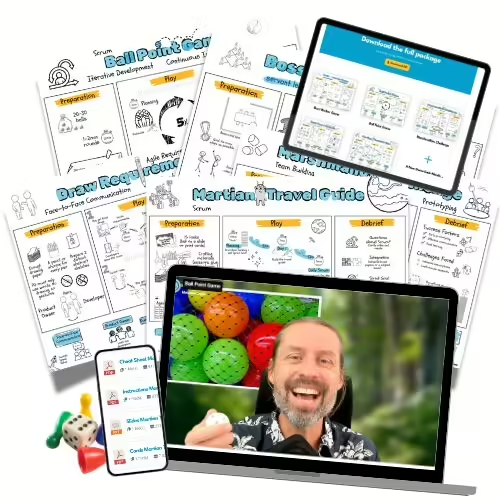Discover a Game-Changing Package
My Agile Games Collection offers a comprehensive toolkit for coaches and trainers to enhance their sessions.
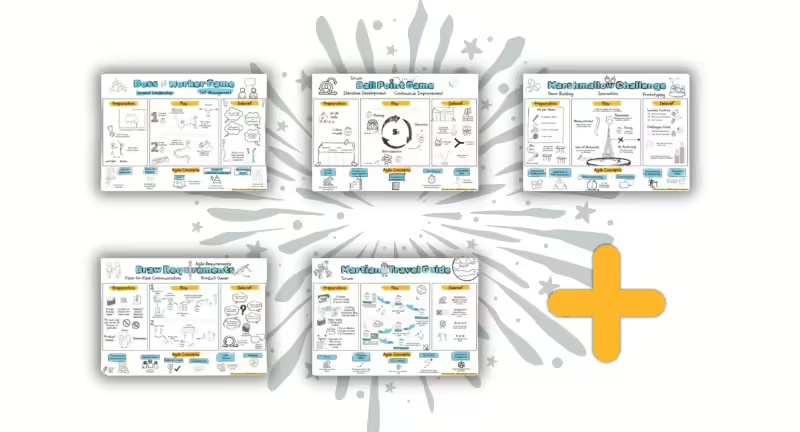
Growing Game Collection
Start with several games, and receive a new game each month, ensuring fresh content and continuous learning. Your purchase incudes 12 months of updates!
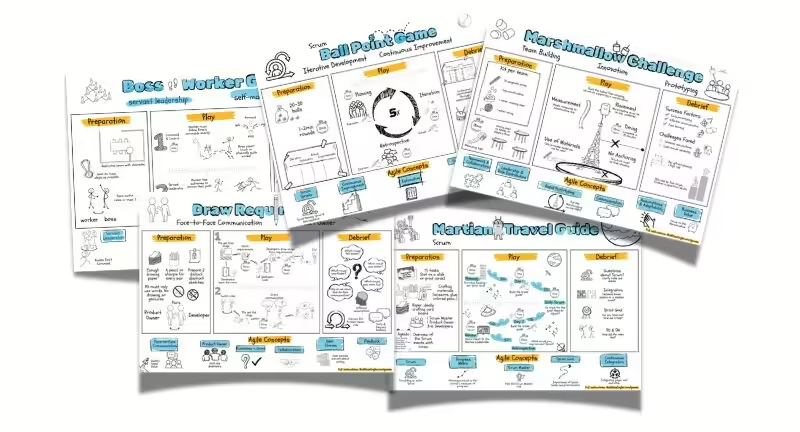
Visual Cheat Sheets
Each game comes with a detailed visual guide to simplify facilitation and enhance understanding.
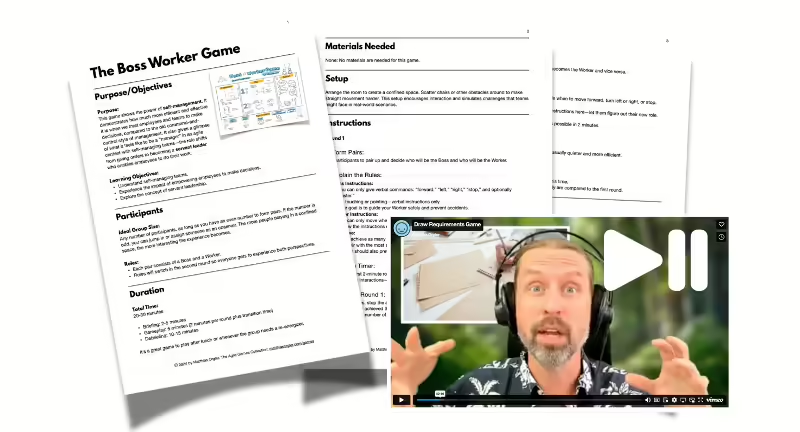
Comprehensive Instructions
Access written instructions complete with facilitation tips to maximize the impact of each game.
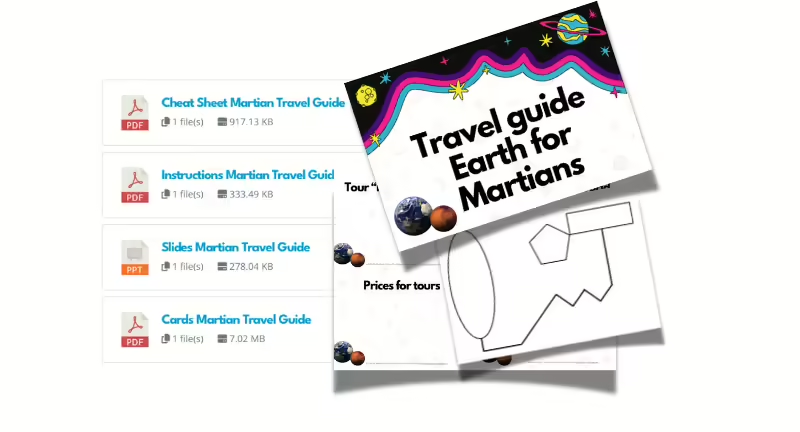
Downloadable Materials
Get the templates and slides you need to run the games efficiently, available for easy download.
Excerpt: Morning Routine
Price
Growing Game Collection
- Access the entire collection for a low annual price.
- Several games straight from the start
- New games added regularly
- Visual cheat sheets
- Comprehensive instructions
- Instruction videos
- Downloadable materials
- Enjoy one year of updates and new games added regularly.
- Lock in the best price now forever – later buyers will pay more as more games are added.
Some Examples
A few games included in the package. New games are added regularly.

Agile Meadow
This game helps participants experience firsthand how agile requirements differ from traditional, task-based requirements.
Learning Objectives:
- Understand the Importance of Context: See how knowing the “who,” “what,” and “why” leads to better outcomes.
- Experience Outcome Over Output: Recognize that focusing on desired outcomes rather than just completing tasks results in higher-quality products.
- Empower Teams: Feel how giving teams the autonomy to decide “how” enhances creativity and engagement.
- Reflect on Current Practices: Trigger discussions about how requirements are handled in your organization and how they can be improved.

Ball Point Game
The Ball Point Game has two main goals:
- To learn about iterative development and the power of continuous improvement.
- To start grasping key concepts of the Scrum framework.
Learning Objectives
- Understand the importance of continuous improvement.
- Experience working in iterations.
- Learn about estimation based on empirical data (yesterday’s weather) and the concept of velocity.
- Get introduced to Scrum concepts like sprints, retrospectives, and planning.
- Recognize what sustainable pace feels like.

Boss-Worker Game
This game shows the power of self-management. It demonstrates how much more efficient and effective it is when we trust employees and teams to make decisions, compared to the old command-and-control style of management.
Learning Objectives:
- Understand self-managing teams.
- Experience the impact of empowering employees to make decisions.
- Explore the concept of servant leadership.

Draw Requirements Game
This game is all about experiencing firsthand why face-to-face communication beats written communication—one of the core agile principles.
Learning Objectives:
- Understand that face-to-face communication is superior to the typical written communication used in organizations, especially in requirements engineering.
- Realize that writing and reading take longer, are more tedious, and often produce worse results.
- Experience how direct face-to-face communication is faster, more enjoyable, less stressful, and leads to better products.
- Understand that the Product Owner or Product Manager should not write long user stories but rather communicate with developers every day.
- Learn that user stories are about collaboration; the written part is just a reminder for a conversation.
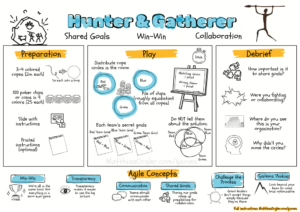
Hunter-Gatherer
This game creates a powerful, hands-on experience of why transparency, shared goals, collaboration, and challenging processes are crucial in an agile environment (or any organization, really!).
Learning Objectives:
- Transparency: Understand the impact of sharing vs. hiding goals.
- Shared Goals: Experience how collaborating toward a common objective benefits everyone.
- Systems Thinking: Realize the pitfalls of optimizing for a single team versus optimizing the entire system.
- Challenging the Process: Learn to question assumed constraints—like immovable circles—to spark innovation.
- Collaboration vs. Competition: See how a “zero-sum” mindset can hamper organizational success.

Marshmallow Challenge
The Marshmallow Challenge serves two big goals: team building and teaching prototyping to uncover hidden assumptions.
Learning Objectives:
- Understand the importance of prototyping and validating hidden assumptions by delivering a working product early on.
- Recognize how big upfront planning without testing assumptions (like the weight of the marshmallow) can lead to catastrophic failure.
- Help team members get to know each other and learn to collaborate effectively.

Martian Travel Guide
This game is a Scrum simulation that lets
participants dive into all Scrum events and roles. It’s a hands-on way to put theory into practice and see how everything fits together.
Learning Objectives:
- Try out Scrum theory in practice: Experience the Scrum framework in a fun, interactive way.
- Experience the interplay of Developers, Scrum Master, and Product Owner: Understand how each role contributes to the team’s success.
- Go through Sprint Planning, Sprint, Daily Scrum, Sprint Review, and Sprint Retrospective: Participate in all Scrum events within a condensed time frame.
- Trigger questions about Scrum: Encourage participants to ask questions that arise from actually putting training theory into practice.
New Games Added Each Regularly
Elevate your coaching sessions and stay ahead in the agile game—invest in the Agile Games Collection today and transform the way you teach!

